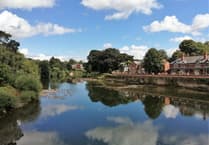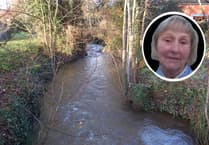THE River Wye and other rivers are at risk of becoming dead zones depleted of wildlife if UK governments don’t ban new factory chicken farms, claims a new report.
New analysis from the food and farming Soil Association charity has revealed that the British public is blind to the scale and growth of the industrial chicken meat sector, which has been expanding at a rate of one million birds per month since 2014, and has reached more than a billion birds per year.
The industry is a leading cause of “dead zones” in the Wye, where the muck from 20 million chickens has contributed to phosphate pollution that causes algal blooms, suffocating plants and starving wildlife.
The new Stop Killing Our Rivers report looked at the escalating number of permits for factory chicken farms in England and Wales.
As a result the Soil Association has also launched a petition calling for a UK-wide ban on new intensive poultry units.

This comes alongside a new opinion poll that showed 80% of people in the UK underestimate the scale of industrial chicken farming. Just one in five realise more than 90% of chickens reared for meat are factory farmed, and only 15% are aware that farming is the biggest polluter of UK rivers.
Soil Association Head of Food Policy Rob Percival said: “Few people realise that industrial chicken production might be the most ethically bankrupt and environmentally destructive business in the UK. It’s the scale and intensity of production that’s the issue – most people would be shocked to learn that poultry populations have been growing at a rate of one million birds every month for the past ten years. It’s gobsmacking, a horror story that is impossible to sustain.
“The system needs to be completely reformed. Farmers operating these units are often doing so out of financial necessity and need a viable alternative. Urgent government action is needed.
“The poultry industry is like a runaway train – if we don’t act now to put the brakes on industrial production, we’ll see more of our rivers becoming dead zones and facing the same desperate fate as the River Wye.”
Millions of fast-growing birds are now held on UK farms. They live for little over a month, suffering leg and heart conditions, and the muck they produce is only cleaned out when they are sent for slaughter.
This means each unit deals with thousands of tonnes of waste from tens of thousands of birds around every six to eight weeks.
Across England and Wales, the majority has been spread on land near the units, and Lancaster University research suggests that excess phosphorus in agricultural soils in the Wye catchment could provide 20 years of fertiliser without further input.
Avara based in Hereford – one of the few processors who dominate the sector – has announced plans to mitigate damage to the Wye by transporting waste out of the catchment.
But Soil Association Campaign Advisor Cathy Cliff, author of the report, said it is “simply impossible” to sustainably manage the sheer number of chickens and the muck they are producing.
She added: “Moving such large volumes of industrial waste to a different part of the country will just mean that another river is at risk – especially in those catchments where factory farms are already concentrated. We do not have time for sticking plasters and false solutions that kick the can down the road.
“For the sake of farmers who need resilient, sustainable businesses, and all the wildlife that depend on rivers like otters, kingfishers and dragonflies, we must act now. We must halt and start reversing the damage that has been caused or we risk our rivers becoming dead zones.”





Comments
This article has no comments yet. Be the first to leave a comment.